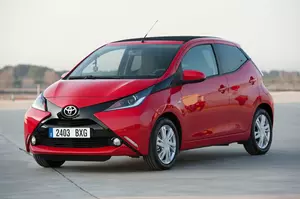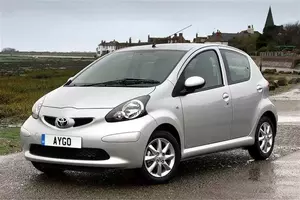
| Vehicle | Precise engine size | Difference from world average | Engine size to consumption ratio | Horsepower from 1 L | Engine size to 100 kg of weight |
|---|---|---|---|---|---|
| 1.0 VVT-i |
1 L (998 cc) |
57.5% smaller | 18 cc to 1 mpg | 72 hp from 1 L | 111 cc to 100 kg |
| Vehicle | 1.0 VVT-i |
|---|---|
| Precise engine size | 1 L (998 cc) |
| Difference from world average | 57.5 smaller |
| Engine size to consumption ratio | 18 cc to 1 mpg |
| Horsepower from 1 L | 72 hp from 1 L |
| Engine size to 100 kg of weight | 111 cc to 100 kg |

| Vehicle | Precise engine size | Difference from world average | Engine size to consumption ratio | Horsepower from 1 L | Engine size to 100 kg of weight |
|---|---|---|---|---|---|
| 1.0 VVT-i |
1 L (998 cc) |
57.5% smaller | 18 cc to 1 mpg | 69 hp from 1 L | - |
| Vehicle | 1.0 VVT-i |
|---|---|
| Precise engine size | 1 L (998 cc) |
| Difference from world average | 57.5 smaller |
| Engine size to consumption ratio | 18 cc to 1 mpg |
| Horsepower from 1 L | 69 hp from 1 L |
| Engine size to 100 kg of weight | - |

| Vehicle | Precise engine size | Difference from world average | Engine size to consumption ratio | Horsepower from 1 L | Engine size to 100 kg of weight |
|---|---|---|---|---|---|
| 1.0 VVT-i |
1 L (998 cc) |
57.5% smaller | 20 cc to 1 mpg | 68 hp from 1 L | 125 cc to 100 kg |
| Vehicle | 1.0 VVT-i |
|---|---|
| Precise engine size | 1 L (998 cc) |
| Difference from world average | 57.5 smaller |
| Engine size to consumption ratio | 20 cc to 1 mpg |
| Horsepower from 1 L | 68 hp from 1 L |
| Engine size to 100 kg of weight | 125 cc to 100 kg |

| Vehicle | Precise engine size | Difference from world average | Engine size to consumption ratio | Horsepower from 1 L | Engine size to 100 kg of weight |
|---|---|---|---|---|---|
| 1.0i 12V |
1 L (998 cc) |
57.5% smaller | 16 cc to 1 mpg | 67 hp from 1 L | 125 cc to 100 kg |
| 1.4 D-4D |
1.4 L (1398 cc) |
40.4% smaller | - | 39 hp from 1 L | 155 cc to 100 kg |
| Vehicle | 1.0i 12V |
|---|---|
| Precise engine size | 1 L (998 cc) |
| Difference from world average | 57.5 smaller |
| Engine size to consumption ratio | 16 cc to 1 mpg |
| Horsepower from 1 L | 67 hp from 1 L |
| Engine size to 100 kg of weight | 125 cc to 100 kg |
| Vehicle | 1.4 D-4D |
| Precise engine size | 1.4 L (1398 cc) |
| Difference from world average | 40.4 smaller |
| Engine size to consumption ratio | - |
| Horsepower from 1 L | 39 hp from 1 L |
| Engine size to 100 kg of weight | 155 cc to 100 kg |